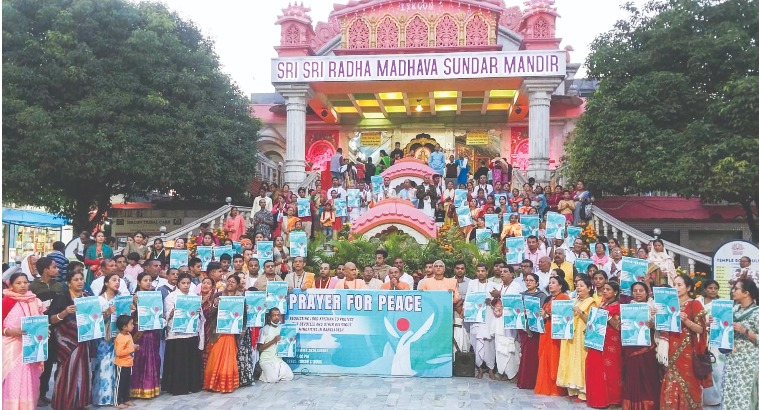1. Introduction: A Diplomatic and Social Flashpoint
Bangladesh Turns recent incident involving members of the International Society for Krishna Consciousness (ISKCON) being denied entry into India from Bangladesh has sparked widespread discussion. The situation has not only drawn attention to the status of religious minorities in Bangladesh but also raised questions about border protocols and diplomatic relations between the two nations.
This article delves into the details of the incident, Bangladesh Turns its implications for India-Bangladesh relations, and the broader context of religious and border policies in South Asia.
2. The Incident: What Happened at the Border?
The group of ISKCON members, Bangladesh Turns reportedly numbering over 50, was stopped at the Benapole-Petrapole border crossing, one of the busiest transit points between Bangladesh and India. According to reports, the individuals were attempting to cross into India for a religious pilgrimage, carrying valid documentation.
Bangladeshi authorities, however, denied them permission to leave the country. Officials cited “security concerns” and procedural issues, though the specifics of these concerns remain unclear. The ISKCON members were subsequently escorted back to their respective hometowns under police supervision.
3. Background: Religious Dynamics in Bangladesh
a. ISKCON in Bangladesh
ISKCON has a significant presence in Bangladesh, Bangladesh Turns home to a large Hindu minority. The organization operates numerous temples and community centers, promoting Hindu religious practices and social welfare activities.
b. Challenges Faced by Religious Minorities
Despite constitutional guarantees of secularism and religious freedom, minorities in Bangladesh often face discrimination and violence. Hindus, in particular, Bangladesh Turns have reported incidents of land grabs, attacks on temples, and social ostracism.
The recent border incident adds to a series of challenges that religious minorities in Bangladesh have faced, raising concerns about their freedom of movement and expression. 
4. Reactions: Outcry and Criticism
The incident has drawn sharp reactions from various quarters:
a. ISKCON Leadership
ISKCON leaders in both Bangladesh and India expressed disappointment over the treatment of their members. They called for a more inclusive approach from Bangladeshi authorities and urged the Indian government to take note of the issue.
b. Indian Government’s Response
While the Indian government has yet to issue an official statement, Bangladesh Turns opposition parties and activists have called for diplomatic action to ensure the protection of Hindu minorities in Bangladesh.
c. Public Opinion
Social media platforms in both countries have been abuzz with debates. While many criticized Bangladesh for its actions, Bangladesh Turns others argued that such incidents should be contextualized within the broader security and administrative challenges faced by the region.
5. Border Protocols: Navigating the Complexities
The denial of entry highlights the complexities of border management between India and Bangladesh, which share a 4,096-kilometer border marked by cultural and historical ties.
a. Legal Framework
The movement of people across the India-Bangladesh border is governed by bilateral agreements, Bangladesh Turns including the Land Boundary Agreement (LBA) of 2015. While the agreement facilitated smoother transit for border residents, stringent checks remain in place to prevent illegal activities.
b. Security Concerns
Bangladesh has been proactive in addressing cross-border crimes, including human trafficking and smuggling. Some analysts suggest that the denial of ISKCON members’ exit might stem from heightened security measures rather than targeting a specific group.
6. Religious Freedom: A Global Concern
The incident raises broader questions about religious freedom and minority rights, Bangladesh Turns not just in Bangladesh but globally.
a. International Standards
Religious freedom is enshrined in international frameworks like the Universal Declaration of Human Rights. Incidents like these highlight the challenges of translating such principles into actionable policies at the national level.
b. The Role of Religious Organizations
Organizations like ISKCON often serve as lifelines for religious minorities, offering not just spiritual guidance but also social and economic support. Ensuring their members’ freedom to practice and propagate their faith is essential for fostering inclusivity.
7. Historical Context: India-Bangladesh Relations
The incident also serves as a reminder of the intertwined histories of India and Bangladesh, Bangladesh Turns particularly in the context of religious coexistence.
a. Shared Heritage
Before the Partition of 1947, Bengal was a unified region with a rich tradition of interfaith harmony. The creation of East Pakistan (now Bangladesh) and subsequent events led to the division of communities along religious lines.
b. Post-1971 Dynamics
Following Bangladesh’s independence in 1971, India and Bangladesh have shared a complex relationship, oscillating between cooperation and contention. Religious issues often emerge as flashpoints, Bangladesh Turns reflecting deeper societal divides.
8. The Way Forward: Building Trust and Inclusivity
a. Strengthening Bilateral Ties
Both India and Bangladesh need to work together to address the concerns of religious minorities and ensure freedom of movement across borders. Bilateral dialogues focusing on human rights and cultural exchange could pave the way for a more harmonious relationship.
b. Policy Recommendations
- For Bangladesh: Implement measures to ensure that minorities feel secure and valued as equal citizens.
- For India: Actively engage with Bangladeshi authorities to address issues affecting Hindu minorities.
- For ISKCON: Continue fostering dialogue and collaboration to promote interfaith understanding.
c. Role of Civil Society
Activists, NGOs, and international organizations can play a pivotal role in bridging gaps and advocating for the rights of minorities. Public awareness campaigns and educational initiatives could help combat prejudice and promote tolerance.
9. Conclusion: Navigating a Sensitive Terrain
The denial of ISKCON members’ entry into India from Bangladesh is more than a procedural hiccup; Bangladesh Turns it is a reflection of the socio-political challenges that persist in South Asia. Addressing such incidents requires a nuanced approach, balancing security concerns with the imperative of protecting religious freedom.
As India and Bangladesh continue to navigate their complex relationship, incidents like these underscore the need for dialogue, understanding, and mutual respect. By working together, Bangladesh Turns both nations can uphold the values of inclusivity and justice, ensuring a brighter future for all their citizens. ALSO READ:- Israeli Military Strikes Kill 32 Palestinians Across Gaza: Escalating Tensions in the Middle East 2024